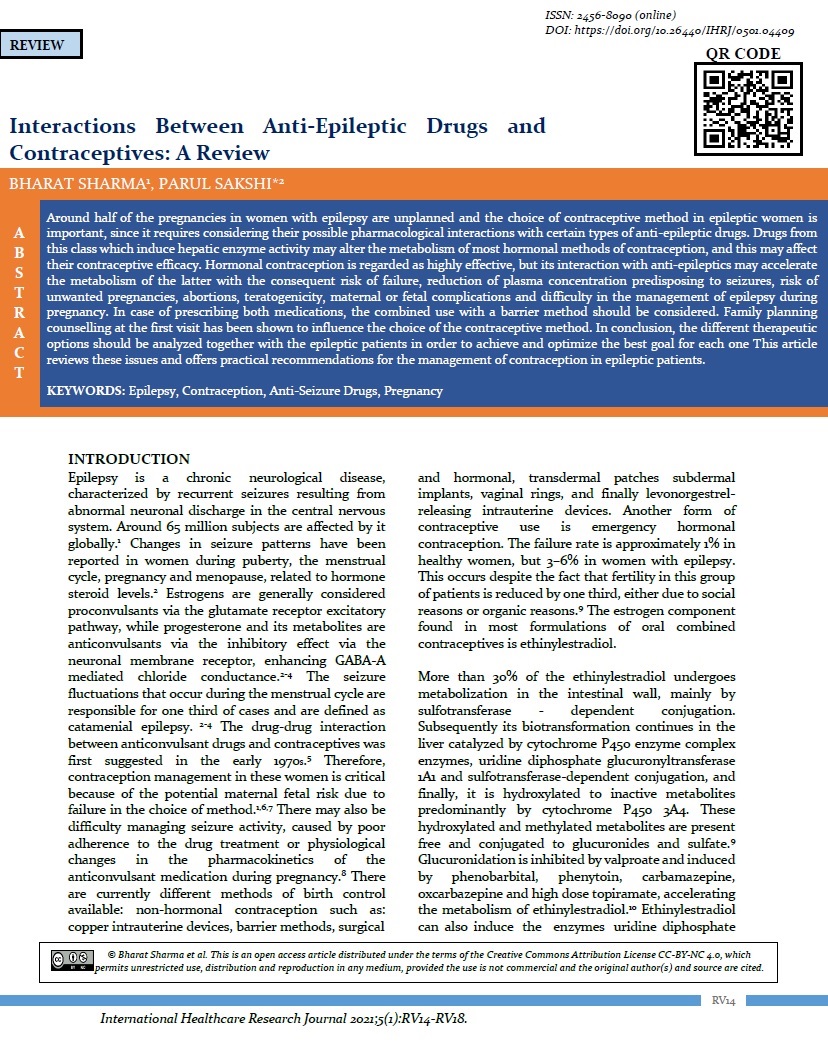Interactions Between Anti-Epileptic Drugs and Contraceptives: A Review
Abstract
Around half of the pregnancies in women with epilepsy are unplanned and the choice of contraceptive method in epileptic women is important, since it requires considering their possible pharmacological interactions with certain types of anti-epileptic drugs. Drugs from this class which induce hepatic enzyme activity may alter the metabolism of most hormonal methods of contraception, and this may affect their contraceptive efficacy. Hormonal contraception is regarded as highly effective, but its interaction with anti-epileptics may accelerate the metabolism of the latter with the consequent risk of failure, reduction of plasma concentration predisposing to seizures, risk of unwanted pregnancies, abortions, teratogenicity, maternal or fetal complications and difficulty in the management of epilepsy during pregnancy. In case of prescribing both medications, the combined use with a barrier method should be considered. Family planning counseling at the first visit has been shown to influence the choice of the contraceptive method. In conclusion, the different therapeutic options should be analyzed together with the epileptic patients in order to achieve and optimize the best goal for each one This article reviews these issues and offers practical recommendations for the management of contraception in epileptic patients.
Downloads
References
Reddy DS. Do oral contraceptives increase epileptic seizures? Expert Rev Neurother. 2017; 17: 129-34.
Bangar S, Shastri A, El-Sayeh H, Cavanna AE. Women with epilepsy: clinically relevant issues. Funct Neurol 2016; 31: 127-34.
Herzog AG, Mandle HB, Cahill KE, Fowler KM, Hauser WA. Differential impact of contraceptive methods on seizures varies by antiepileptic drug category: findings of Epilepsy Birth. Epilepsy Behav 2016; 60: 112-7.
Tauboll E, Sveberg L, Svalheim S. Interactions between hormones and epilepsy. Seizure 2015; 28: 3-11.
Sabers A. Pharmacokinetic interactions between contraceptives and antiepileptic drugs. Seizure 2008; 17: 141-4.
Herzog AG, Mandle HB, Cahill KE, Fouler KM, Hauser WA. Predictors of unintended pregnancy in women with epilepsy. Neurology 2017; 88: 728-33.
Thomas SV. Controversies in contraception for women with epilepsy. Ann Ind Acad Neurol 2015; 18: 278-83.
Stephen LJ, Harden C, Tomson T, Brodie MJ. Management of epilepsy in women. Lancet Neurol 2019; 18: 481-91.
Reimers A, Brodtkord E, Sabers A. Interactions between hormonal contraception and antiepileptic drugs clinical and mechanistic considerations. Seizure 2015; 28: 66-70.
Bosak M, Cyranka k, Slowik A. Hormonal contraception in patients with epilepsy. Ginekol Pol 2019; 90: 61-5.
Brodie MJ. Antiepileptic drug therapy the story so far. Seizure 2010; 19: 650-5.
Bialer M. New antiepileptic drugs that are second generation to existing antiepileptic drugs. Expert Opin Investig Drugs 2006; 15: 637-47.
Vidaurre J, Herbst J. New antiepileptic drugs. Medicina (B Aires) 2019; 79: 48-53.
Stefanović S, Janković SM, Novaković M, Milosavljević. Pharmacodynamics and common drug-drug interactions of the third-generation antiepileptic drugs. Expert Opin Drug Metab Toxicol 2018; 14: 153-9.
Burgos NS, Parra MA. Epilepsia y anticonceptivos. Rev Chil Obstet Ginecol 2004; 69: 470-5.
Gooneratne IK, Wimalaratna R, Ranaweera AKP, Wimalaratna S. Contraception advice for women with epilepsy. BMJ 2017; 357-60.
Herzog AG, Mac Eacherm DB, Mandle Hb, Cahill KE, Fowler KM, Davis AR. Folic acid use by women with epilepsy: Findings of the Epilepsy Birth. Epilepsy Behav 2017; 72: 156-60.
Beier CP, García Rodríguez LA, Sáez ME, Gaist D, González- Pérez A. Hormonal contraception is not associated with increased risk for seizures in the general population: results from a cohort study using The Health Improvement Network. Eur J Clin Pharmacol 2018; 74: 1175-80.
Halani S, Tshering L, Bui E, et al. For the Brutan Epilepsy Project. Contraception, pregnancy and peripartum experiences among women with epilepsy in Bhutan. Epilepsy Res 2017; 138: 116-23.
Herzog AG, Mandle HB, Cahill KE, Fowler KM, Hauser WA. Contraceptive practices of women with epilepsy: Findings of the epilepsy birth control registry. Epilepsia 2016; 57:630-7.
Mandle HB, Cahill KE, Fowller KM, Hauser WA, Davis AR, Herzog AG. Reason for discontinuation of reversible contraceptive methods by women with epilepsy. Epilepsia 2017; 58: 907-11.
Espinera AR, Gavvala J, Bellinski I, et al. Counseling by epileptologists affects contraceptive choices of women with epilepsy. Epilepsy Behav 2016; 65: 1-6.
Suto HS, Braga GC, Scarpellini GR, et al. Neurologist knowledge about interactions between antiepileptic drugs and contraceptive methods. Int J Gynaecol Obstet 2016; 134: 264-7.
Battino D, Tomson T, Bonizzoni E, et al. European Study group. Epilepsy 2013; 54: 1621-27.

Copyright (c) 2021 Bharat Sharma et al.

This work is licensed under a Creative Commons Attribution-NonCommercial 4.0 International License.


